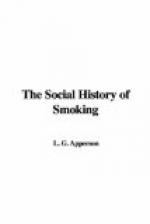When Robert, Earl of Essex, and Henry, Earl of Southampton, were tried for high treason in Westminster Hall on February 19, 1600-1, the members of the House of Lords, who with the Judges formed the Court, if we may believe the French Ambassador of the time, behaved in a remarkable and unseemly manner. In a letter to Monsieur de Rohan, the Ambassador declared that while the Earls and the Counsel were pleading, their lordships guzzled and smoked; and that when they gave their votes condemning the two Earls, they were stupid with eating and “yvres de tabac”—drunk with smoking. This was probably quite untrue as a representation of what actually took place; but it would hardly have been written had smoking not been a common practice among noble lords.
Queen Elizabeth’s Secretary of State, Sir Robert Cecil, would appear to have been a smoker. In a letter addressed to him, John Watts, an alderman of London, wrote: “According to your request, I have sent the greatest part of my store of tobaca by the bearer, wishing that the same may be to your good liking. But this tobaca I have had this six months, which was such as my son brought home, but since that time I have had none. At this period there is none that is good to be had for money. Wishing you to make store thereof, for I do not know where to have the like, I have sent you of two sorts. Mincing Lane, 12 Dec. 1600.”
A curious scene took place at Oxford in 1605 when King James visited the University. Two subjects were debated by learned dons before his Majesty, and one of them, at his own suggestion, was, “Whether the frequent use of tobacco is good for healthy men?” Among those who spoke were Doctors Ailworth, Gwyn, Gifford and Cheynell. The discussion, needless to say, being conducted in the presence of the author of the “Counterblaste to Tobacco,” was not favourable to the herb. The King summed up in a speech which hopelessly begged the question while it contained plenty of strong denunciation. After his Majesty had spoken, one learned doctor, Cheynell, who is described by the recorder, Isaac Wake, the Public Orator of the University, as second to none of the doctors, had the courage to rise and, with a pipe held forth in his hand, to speak both wittily and eloquently in favour of tobacco from the medicinal point of view, praising it to the skies, says Wake, as of virtue beyond all other remedial agents. His wit pleased both the King and the whole assembly, whom it moved to laughter; but when he had finished, his Majesty made a lengthy rejoinder in which he said some curious things. He objected to the medicinal use of tobacco, and quite agreed with previous speakers that such a use must have arisen among Barbarians and Indians, who he went on to say had as much knowledge of medicine as they had of civilized customs. If, he argued, there were men whose bodies were benefited by tobacco-smoke, this did not so much redound to the credit of tobacco, as it did reflect upon the depraved condition of such men, that their bodies should have sunk to the level of those of Barbarians so as to be affected by remedies such as were effective on the bodies of Barbarians and Indians! His Majesty kindly suggested that doctors who believed in tobacco as a remedial agent should take themselves and their medicine of pollution off to join the Indians.




